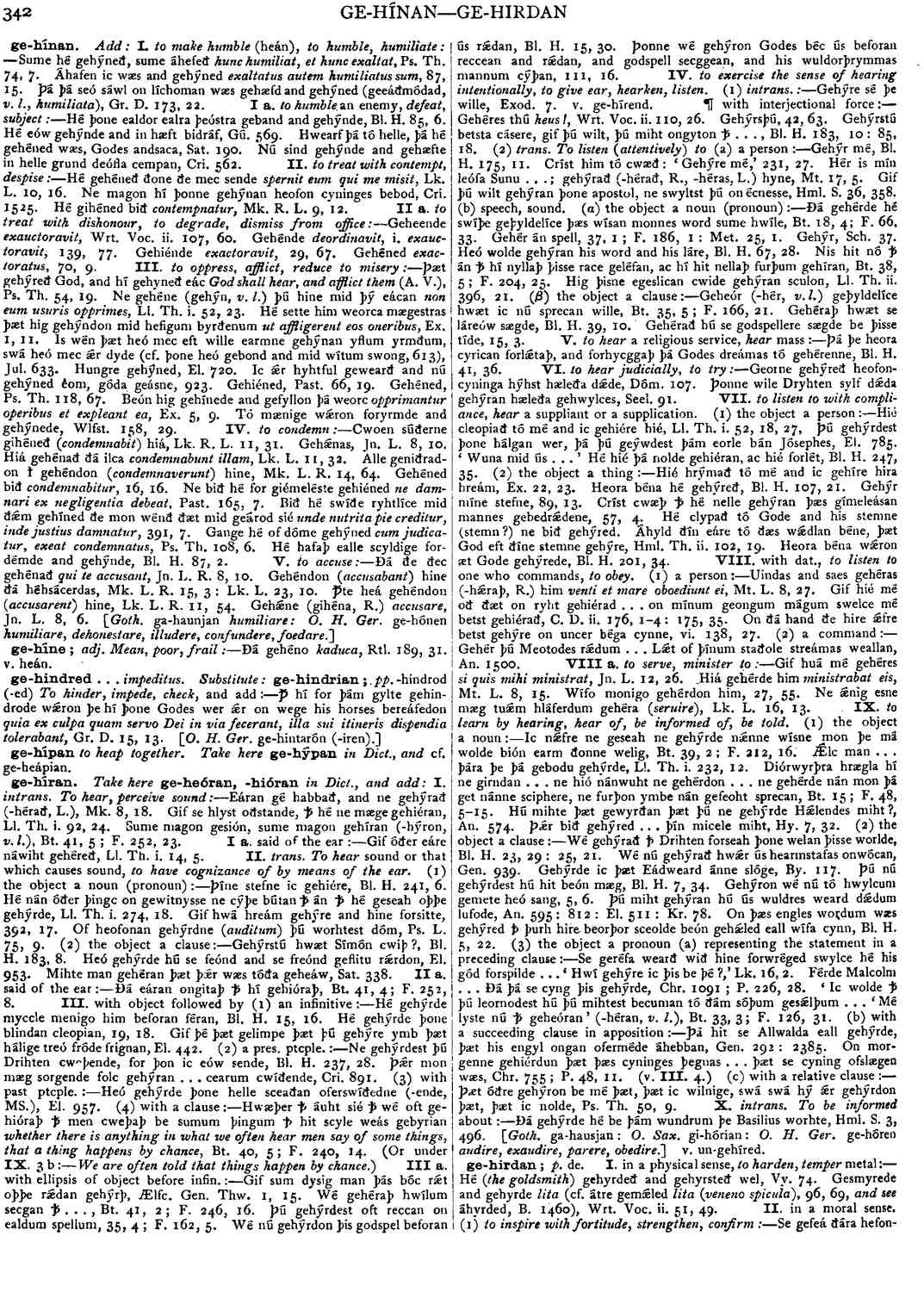ge-hínan
-
Sume hé gehýneð, sume áhefeð
hunc humiliat, et hunc exaliat
.- Ps. Th. 74, 7.
-
Áhafen ic wæs and gehýned
exaltatus autem humiliatus sum
,- 87, 15.
-
Þá þá seó sáwl on líchoman wæs gehæfdand gehýned (geeáðmódad, v. l. , humiliata), Gr. D. 173, 22. I a. to humle an enemy,
defeat, subject
:-- Hé þone ealdor ealra þeóstra geband and gehýnde,- Bl. H. 85, 6.
-
Hé eów gehýnde and in hæft bidráf,
- Gú. 569.
-
Hwearf þá tó helle, þá hé ; gehéned wæs, Godes andsaca,
- Sat. 190.
-
Nú sind gehýnde and gehæfte in helle grund deófla cempan,
- Cri. 562.
-
Hé gehéneð ðone ðe mec sende
spernit eum qui me misit,
- Lk. L. 10, 16.
-
Ne magon hí þonne gehýnan heofon cyninges bebod,
- Cri. 1525.
-
Hé gihéned bið contempnatur, Mk. R. L. 9, 12. II a. to treat with dishonour, to degrade, dismiss from office :-- Geheende
exauctoravit
,- Wrt. Voc. ii. 107, 60.
-
Gehénde deordinavit, i.
exauc-toravit
,- 139, 77.
-
Gehiénde
exactoravit
,- 29, 67.
-
Gehéned
exac-toratus
,- 70, 9.
-
Þæt gehýreð God, and hí gehýneð eác
God shall hear, and afflict them
(A.- V. ), Ps. Th. 54, 19.
-
Ne gehéne (gehýn, v. l.) þú hine mid þý eácan
non eum usuris opprimes
,- Ll. Th. i. 52, 23.
-
Hé sette him weorca mægestras þæt hig gehýndon mid hefigum byrðenum
ut affligereat eos oneribus
,- Ex. I. II.
-
Is wén þæt heó mec eft wille earmne gehýnan yflum yrmðum. swá heó mec ǽr dyde (cf. þone heó gebond and mid witum swong, 613)
- , Jul. 633.
-
Hungre gehýned,
- El. 720.
- Ic ǽr hyhtful gewearð and nú gehýned éom góda geásne, 923.
-
Gehiéned,
- Past. 66, 19.
-
Gehéned,
- Ps. Th. 118, 67.
-
Beón hig gehínede and gefyllon þá weorc
opprimantur operibus et expleant ea
,- Ex. 5, 9.
-
Tó mænige wǽron foryrmde and gehýnede,
- Wlfst. 158, 29.
-
Cwoen súðerne gihéneð (
condemnabit
) hiá,- Lk. R. L. II. 31.
-
Gehǽnas,
- Jn. L. 8, 10.
-
Hiá gehénað ðá ilca
condemnabunt illam, Lk. L. 11, 32, Alle geniðrad-on ł gehéndon (condemnaverunt )
hine,- Mk. L. R. 14, 64.
-
Gehéned bid
condemnabitur
,- 16, 16.
-
Ne bið hé for giémeléste gehiéned
ne dam-nari ex negligentia debeat
,- Past. 165, 7.
-
Bið hé swíðe ryhtlíce mid ðǽm gehíned ðe mon wénð ðæt mid geárod sié
unde nutrita pie creditur, indejustius damnatur
,- 391, 7.
-
Gange hé of dóme gehýned
cum judica-tur, exeat condemnatus
,- Ps. Th. 108, 6.
-
Hé hafaþ ealle scyldige for-démde and gehýnde,
- Bl. H. 87, 2.
-
Ðá ðe ðec gehénað
qui te accusant
,- Jn. L. R. 8, 10.
-
Gehéndon (
accusabant) hine ðá héhsácerdas, Mk. L. R. 15, 3 ; Lk. L. 23, 10 Ꝥte heá gehéndon (accusarent )
hine,- Lk. L. R. II. 54.
-
Gehǽne (gihéna, R.)
accusare
,- Jn. L. 8, 6.
Bosworth, Joseph. “ge-hínan.” In An Anglo-Saxon Dictionary Online, edited by Thomas Northcote Toller, Christ Sean, and Ondřej Tichy. Prague: Faculty of Arts, Charles University, 2014. https://bosworthtoller.com/48298.
Checked: 0